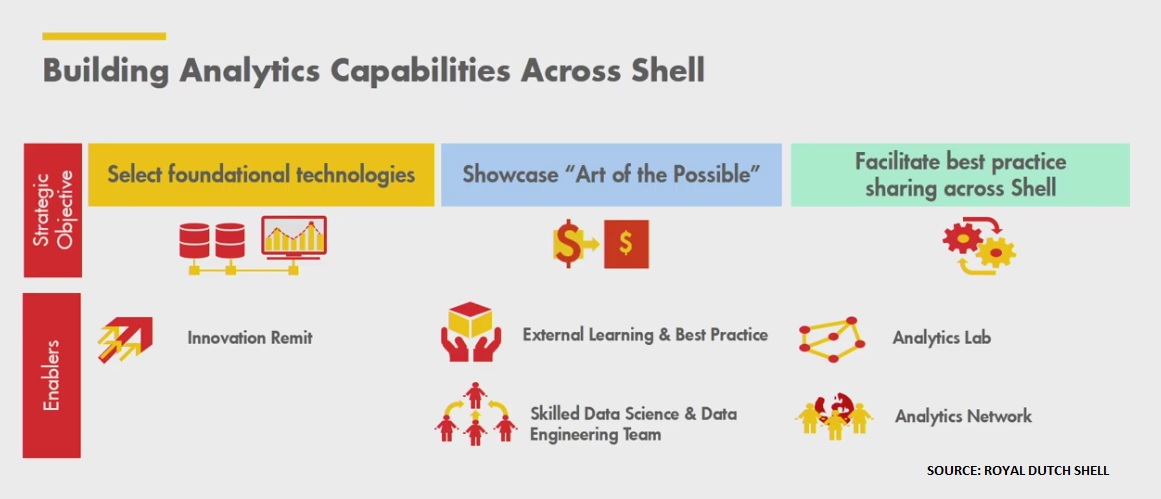Royal Dutch Shell Spreads Data Science Success
Shell center of excellence grows data science talent, masters funding and innovation challenges.
Sometimes the value of a case study is in learning about what was achieved, while in other cases it’s all about how it was achieved. I think my latest case study, about the Data Science Center of Excellence (COE) at Royal Dutch Shell (Shell), works on both levels, but the most interesting nuances relate to how Shell’s COE is organized and funded.
If you’ve attended recent Alteryx Inspire or Microsoft Ignite events, you might have heard a bit about Shell’s achievements. I first learned of Shell’s efforts to spread data science capabilities at Alteryx Inspire 2018 in Anaheim, where Deval Pandya, a Shell data scientist, gave an great talk on how the COE is helping to spread the power of advanced analytic methods without hiring armies of hard-to-find data scientists. COE execs work with line-of-business and supporting tech teams for a few days at a time, helping to spearhead innovation projects. They then coach these teams and help to harden the technologies so that can be sustained in production. Pandya cited successes including an inventory optimization project – detailed at great length in my case study – that has since been leveraged globally and is saving Shell millions of dollars annually.

I encountered Shell again at Microsoft Ignite 2018, where keynote attendees heard a bit about Shell’s use of Azure cloud service and advanced capabilities including machine vision and Internet-of-Things-style sensor monitoring. Several of these projects, as well as the associated business benefits, are also detailed in my case study.
It’s always great to hear about innovative tech projects and to see and meet customer executives at vendor events, but for Constellation Research, that’s just the beginning of the conversation. Where vendors tend to highlight just how their products were used, Constellation aims to share holistic insight on every aspect of innovation, including all relevant technologies and how the project – or, in this case, the COE -- was organized.
I’ve written about plenty of centers of excellence, competency centers and innovation centers, but two things struck me as being atypical about the Shell Data Science COE. For one thing, Shell has separated the tasks of data science innovation, which is led by the COE, and that of handling ongoing operational execution of completed data science applications. The latter task is handled by Shell’s Business Service Center. The key point is that innovation is often disruptive, whereas those in the ongoing operational role naturally seek out continuity and proven best practices.
“If you want a group that’s going to stay ahead of the latest trends, you can’t ask them to also operate everything,†observes Daniel Jeavons, general manager of data science at Shell and the key figure quoted throughout my report. “Our role is up front trying to identify the technologies that need to be developed and built out to the point of maturity.â€
The second way in which Shell’s COE stands out has helped it avoid budget hardships. Because it’s under Shell’s Technology Group, which is tasked with driving innovation and differentiation, the COE has what Jeavons describes as a healthy mix of research-and-development and project-based funding.
“We need to be a catalyst for change within the organization, but that’s hard if you’re constantly trying to justify your existence with project funding,†he explains. “The business is paying us to run projects that deliver value now or in the near term, but at the same time we have the opportunity to innovate†[because of the funding dedicated to R&D and innovation].
There’s much more to learn in the Shell case study, including insight on its analytics stack and how and why it makes use of two major public clouds. There’s also insight on AI and IoT initiatives that are bearing fruit. But my key takeaway on Shell’s success is that it has found a way to balance stable execution that delivers value and, through the COE, breakthrough innovation that might be disruptive, but that is helping Shell to change its industry and the very foundations of its business.

